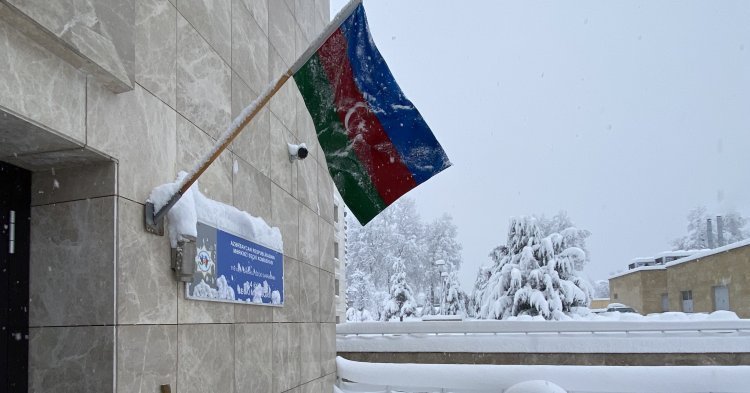Azerbaijan, the land of fire. Already in the days of the Russian Empire, businessmen -including Ludvig Nobel and the banking dynasty Rothschild- were drawn to this part of the world, rich in oil and gas. Baku developed into the world’s first oil production hub and subsequently came to some wealth. If you leave the oriental old town through one of the medieval gates, you will find yourself in 19th century Europe: historicism, art nouveau, true Europeanness in the Caucasus.
But what’s Europe anyway? Where does it begin, where are its borders? The language in Baku sounds rather foreign, related to Turkish. If you walk along the promenade on the Caspian Sea or drive from the airport towards the city centre, you will soon be reminded of Dubai thanks to the ultramodern architecture. And yet it almost feels a bit like home when I walk past an art class and see the face of Klimt’s Adele. I ask myself: Why should the elections here be so different from those in Austria or other European countries?
As an international election observer, you are under the host country’s protection. However, accreditation by the respective election authorities is of course necessary. On this election observation mission, there was first an introduction by the central election commission of Azerbaijan: 125 members of parliament would be elected in a first-past-the-post system, we were told. In each polling station there would be representatives from the government and opposition as well as independents. The same would apply to local election observers. A friend of mine from university had told me before that for the first time all candidates were admitted to these elections. The general mood in the mission was optimistic.
Election Day: uproar
Finally, the big day. Some of the mission participants were stationed in inland districts, others in the Baku area. The local partners took us to different polling stations and translated what members of the election commission and local observers told us. Here and there, we were able to speak in English - for example with an independent candidate who was confident about succeeding thanks to her strong social media campaign. Facebook and other social networks are not blocked in Azerbaijan, and young candidates have been working on their online presence accordingly in recent years. Our interviewee worked as a freelance journalist and focused on youth and women’s issues during her campaign. However, she avoided more unpleasant questions, such as how fair and free she deemed the elections.
A candidate in another constituency was more outspoken: the chair of the election commission in the polling station caught some critical remarks, approached us, upheaval broke out. Voices became louder, election observers pulled out their cell phones and began to film. An exaggerated reaction? The situation was unpleasant, the language barrier further exacerbated it. There was no other choice than to escape. The young candidate –probably around 30 years old– followed us outside. She told us about intimidation by the authorities as well as so-called “bus voting”, which describes that voters are brought from one district to another in order to alter the results in contested constituencies. In a majority voting system, this can change the outcome of the election significantly, and it doesn’t seem to be an unusual practice here. Although we were not given concrete proof, the feeling of mistrust remained.
Numerous pieces of a big puzzle
In the evening, all members of the mission met in Baku to write a report on the elections. Little by little, the participants reported on their observations. What on its own might have been a single irregularity became a democratic fiasco when put together: While the central election commission had praised the livestream cameras in the polling stations for preventing election fraud, it was now reported several times that they had been covered up.
The counting process did not seem to be carried out according to consistent rules and the four-eye principle was hardly obeyed during the actual counting. Local observers, many of whom did not quite know which candidate or party they were representing, had to stay back a few metres. Voter turnout was perceived as particularly low at all stations, another democratic shortcoming – whether it was actually due to the stormy weather, as we had been told, or because of the expectation that nothing would change anyway.
The feeling of unfreedom
In the end, the ruling party expanded its majority. A single opposition seat was won and many at least nominally independent candidates would enter the so-called Milli Məclis. Foreign news outlets, only accessible via a VPN client, reported on various incidents during the election, many of which were reflecting our own experiences. Videos appeared on social media in which election observers were forcibly chased away. Others showed overt election fraud.
We confidently wrote our reports all night long, only to find out that we would not be allowed to present our observations in said way: it would be better, we were told, to talk about youth participation and the equipment of the polling stations at the scheduled press conference. But that was certainly not why we had come to Baku. Our local contact person was perceptibly tense: he had clearly already dealt with the powerful state before and feared further reprisals. We gave in, because we understood that we were potentially putting someone else in danger. So that’s what it feels like – this feeling of not being able to say openly what you think.
Of course, we reached an agreement: instead of presenting the report, a press statement was to be read out, critical in content but not too harsh in language. The questions from the journalists were not very exhaustive. Only later on, individual mission participants were interviewed more extensively – with unexpected consequences. The local media did not simply leave out criticism in their reports, they put utterly made-up statements into our mouths. Media disinformation and fake news, experienced first-hand. And: the powerlessness to fight back.
A long path
A counterstatement has meanwhile been published. Apart from that, we tried to set the record straight on Twitter and other platforms. In the end, there can be no talk of a silent civil society that simply accepts everything: Many people –especially the youth– long for fair and free elections in Azerbaijan. Many things were foreign to us in this country, but many things are no different from Europe – be it the Parisian streets of Baku or the desire for participation in decision-making and change.
While I was strolling through Baku, the city of winds, which undeniably lives up to its name, on my last day, I remembered that young combative candidate. Before leaving, I had shaken her hand, encouraged her: "The way may be hard and rocky, but democracy and freedom are always worth the fight.”


Follow the comments: |
|
